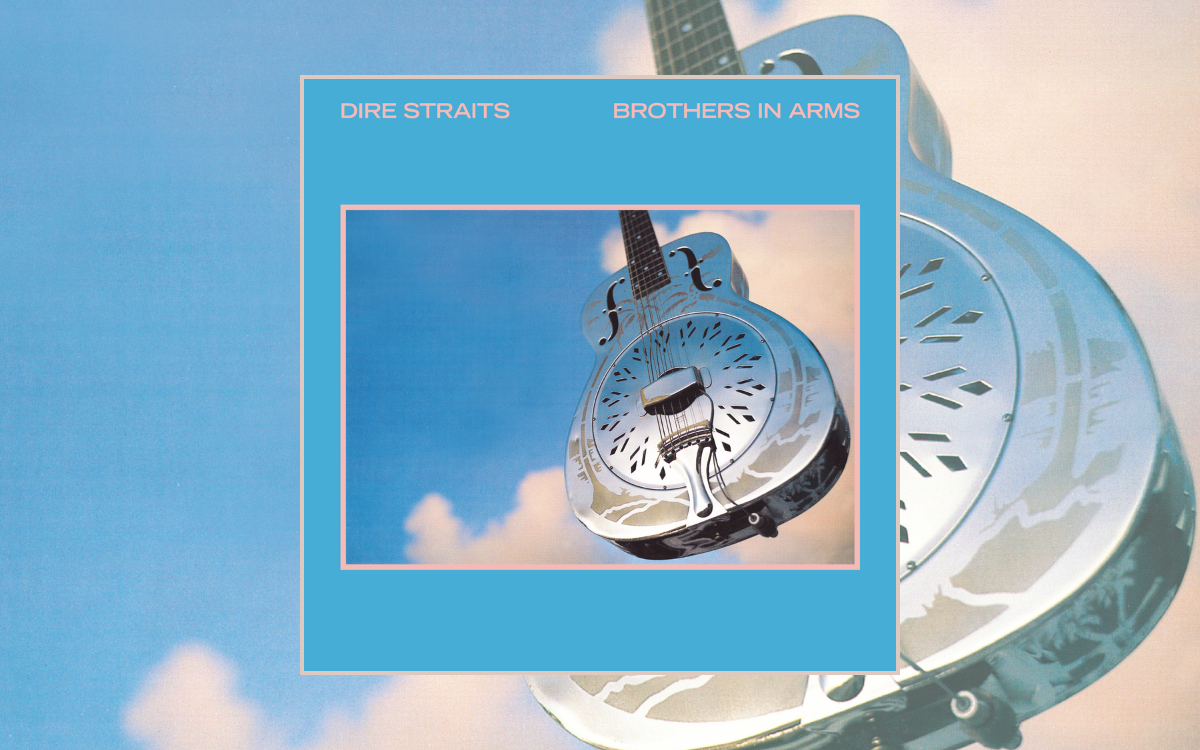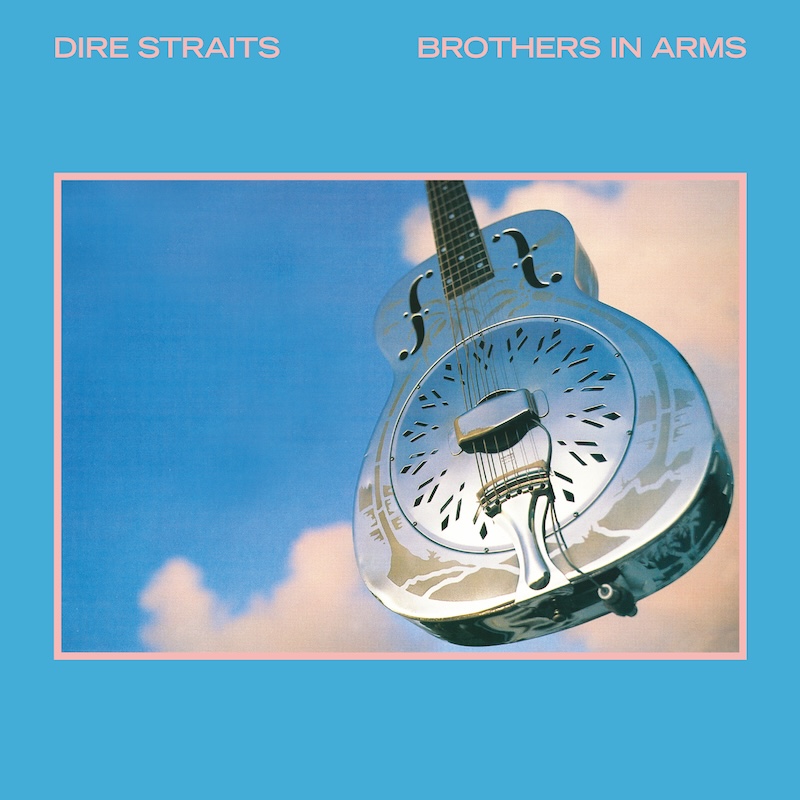John Illsley and Guy Fletcher discuss making a timeless masterpiece

Forever thought of as the album that launched the CD Format, Dire Straits’ Brothers In Arms was a rare example of a mega-seller whose recording was largely as untroubled as it gets. As it turns 40, bassist John Illsley and then-new keyboardist Guy Fletcher recall the happy coincidences which led to a classic – and how the band’s friendships confused the hell out of Sting…
“I’ve never had a CD player.” From a member of Dire Straits, this sounds like sacrilege. Their fifth album Brothers In Arms was synonymous with the rise of compact discs: one of the first major releases to be recorded wholly digitally (though Heaven 17 and Haircut 100 had got there first), its pristine sheen made it perfect to test the new format’s crystal clear audio… helped by the fact that compact disc developers Philips owned Dire Straits’ record label, Phonogram.
However, keyboardist Guy Fletcher was having none of it. “I don’t need a CD player,” he insists. “I have my studio, so I’ve never owned a hi-fi. Philips’ technology was cutting-edge, but it wasn’t very robust. They gave the band a bunch of CD players, which all broke within a week. You have to go through those teething troubles to find out what does and doesn’t work.”
Deciding to record the album digitally at the same time as CDs were suddenly in vogue was a happy chance, especially as Fletcher and bassist John Illsley credit producer Neil Dorfsman with making Brothers In Arms sound like a warm, human rock record under its surface polish.
‘I Want My MTV!’
“Digital recording technology improved quickly,” recalls Fletcher. “But it was flaky at the time, and Neil accomplished a great piece of work, sonically, so it didn’t surprise me that Brothers In Arms became so associated with CDs.”
Illsley adds: “The CD revolution came along when we happened to be there. These happy coincidences can’t be ignored. The funny thing is, a lot of sound aficionados loved the CD… and then bought the album on vinyl, too.”
The bassist is the first to accept that Brothers In Arms had a lot of happy coincidences to help its sales along. Mark Knopfler was prescient to write “I want my MTV!” for Sting to pop by the studio to sing on Money For Nothing, but the channel lapped up Steve Barron’s groundbreaking computer animated video.
“The band was inadvertently breaking new ground in lots of different ways,” he smiles, talking by Zoom from his comfy-looking home studio in Provence. “Steve’s Money For Nothing video was new technology and, to be honest, I didn’t understand any of it. But it was unique, and MTV came to Europe from America when we had a very innovative video. Put that and CDs into the bag, and you’ve got a serious amount of good fortune on your side.”
Building Momentum
Of course, a band makes its own luck and Dire Straits had ensured that an excellent album could propel them to the next level, video pioneers or not. Their previous album Love Over Gold had reached No.1 in 1982, while 1984’s Alchemy is one of the era’s great live records. “After four successful albums, we knew Brothers In Arms was going to be a major release,” recalls Illsley. “You can act casual and say: ‘Oh, it’s just another record,’ but it wasn’t going to be, not really. By that time, a Dire Straits album coming out was a major thing. And we were given the finances to spend time on that record.”
By 1980s standards, spending three years between albums was an unheard-of luxury. “We hadn’t had any time off since we started, and we needed a break,” insists the bassist. “It was good for us to go off and do different things.” For Illsley, that meant making his debut solo album, Never Told A Soul. “That always pleases the record company,” he laughs. “‘Oh God, the bass player wants to make a record!’ But I enjoyed pushing myself to be a writer and I think everyone came back excited to make another Dire Straits record.”
Meanwhile, Mark Knopfler had made the film soundtracks for Cal and Comfort And Joy with a new keyboard player. “From the word go, Mark and I could read each other’s thoughts,” remembers Guy Fletcher, who remains the co-producer with Knopfler for his solo albums.
Creative Stream
“Neither of us are trained musicians, so we developed a language when we work together. Mark was a flurry of ideas, and I was enabling that creative stream.”
By the time Dire Straits reconvened, it was natural that Fletcher should be there, too. “I can’t even remember being asked to join the band,” he considers. “Mark and I had worked together so intensively on those films, it was just taken as verbatim that I’d be there. When Mark gets cracking, he’s a whirlwind, so I was suddenly in the room with the band.”
Although the band already had a keyboard player in Alan Clark, Fletcher fitted in naturally. Keys had come more to the fore in Dire Straits’ sound on Making Movies and Love Over Gold, while recording digitally meant a new type of keyboard coming in: the Synclavier, which Knopfler had seen his friend Peter Gabriel use.
“Guy understood the technical side,” explains Illsley. “He knew which buttons to press on the Synclavier, while the rest of us looked at it, going: ‘Oh hell…’ Guy took us to another level.”
There was no rivalry between Fletcher and Clark, as the former shrugs: “We got on really well. Alan was always the main piano and Hammond player, and I’d cover everything else.” The only exception came on the accordion for the title track. “Neither of us knew how to play it, so we busked it,” says Fletcher. “I squeezed it, while Alan played the melody on the keys. We decided that by tossing a coin. Having two keyboard players came in handy then.”
Caribbean Getaway
Following rehearsals at Roxy Music guitarist Phil Manzanera’s studio in Surrey, Dire Straits decamped to George Martin’s AIR Studios in Montserrat, as recommended to the band by Sting, Eric Clapton and Phil Collins. “The reports were that Montserrat was a simple island with few distractions,” remembers Illsley. “The studio was apparently fabulous and it came with a great cook, which is always important.”
There were even fewer distractions than the band had expected, as it rained solidly for the first six weeks of recording. “It really was very secluded,” notes Fletcher. “Montserrat was very chilled and relaxing, and you can hear the influence of the island on the production. Sometimes that was subconscious, and sometimes we used the real life of Montserrat, like the crickets you can hear on Ride Across The River.”
Illsley takes up the theme: “The sound of where you’re recording should affect you. Recording in New York definitely affected Making Movies and Love Over Gold, while the semi laidback feel of Communiqué smells of the Bahamas, not just because of the large amount of rum we consumed. It would be weird if Montserrat hadn’t impacted on Brothers In Arms.”
Secluded as it was, another happy coincidence led Sting to sing that memorable “I want my MTV!” line on Money For Nothing, as he happened to be on holiday in Montserrat. “He was pretty much the only tourist there,” grins Fletcher. Sting had fallen in love with the island despite the famously fraught sessions The Police had endured the previous year when making their final album, Synchronicity. Fletcher smiles wider and reveals: “The first thing Sting said when he walked into the studio was: ‘What’s wrong? Nobody is arguing.’”
Just Not Clicking
The only real trouble in making the album arrived when, dispersing for Christmas after those rainy initial six weeks, the band returned to Montserrat in early 1985 to find problems with the cutting-edge digital tape Neil Dorfsman had used for those first sessions. Several individual parts had been wiped, especially those laid down by drummer Terry Williams.
Having joined Dire Straits for the Alchemy tour, Williams had struggled in those first studio recordings, as Illsley explains: “Terry was attempting to play to a click track, which we’d never used as a band before. He was finding it difficult. The decision was made – which wasn’t easy – to import Omar Hakim into the sessions.”
Legendary session drummer Hakim immediately made a positive impression, as Illsley remembers: “By the time Omar finished setting his drumkit up, he was playing four different things with his arms and legs. It was: ‘Right, great, I think you can play Walk Of Life.’ Omar did everything in three days.”
Illsley might be joking about the simplicity of Walk Of Life, but the joyous track’s infectiousness highlights Brothers In Arms’ diversity, with the title track a powerful pro-peace epic inspired by the Falklands War. As Illsley puts it: “Walk Of Life was an antidote to the other serious songs on the album.”
Slow Burn
He’s right, and it would equal Dire Straits’ No.2 best singles chart placing of Private Investigations. “Some view us as a very serious band, so it’s good when people see us loosen up a bit,” reasons Illsley.
“It was the same when we released Twisting By The Pool. We had no idea that would be a hit, because we’d only recorded it to introduce Terry to the band. But it was summertime, Twisting… had a silly video, suddenly people went nuts when we played it live.
“Choosing singles was a record company thing, and Dire Straits are never thought of as a singles band. But Walk Of Life and Twisting By The Pool are two of our poppiest songs.” Illsley chuckles while peering into his laptop camera, on considering Dire Straits’ singles. “Hey, this is for Classic Pop, right? There’s another happy coincidence.”
The album’s other huge hit reached No.1 in the US, yet Money For Nothing almost never happened. “At one point, it wasn’t going to be on the album,” reveals Fletcher. “Mark had lost interest in it. I won’t say it would be consigned to the bin, but he’d had enough of it. Then Neil said to me: ‘Let’s try a synth on it.’ He wanted the sound of a dinosaur on it, so I got a dinosaur-y sound from my Yamaha DX1. The next morning, the band went: ‘Wow! Cool!’ and Mark added the guitar on – then it really started to happen.”
The band were busy touring in the States when Money For Nothing joined the album in topping the US chart, allowing manager Ed Bicknell to enter their dressing room after a Midwest show to announce: “Do you want the good news or the good news?”
“The success was a slow burn,” remembers Fletcher. “We’d arrive in a new country to be told we were No.1 there, and that kept happening.” “America went nuts for the band,” adds Illsley. “To be frank, you couldn’t have put a better scenario together for an album.”

A Peak You Reach
The 40th anniversary reissue of Brothers In Arms adds a previously unreleased live album, recorded at the 6,000-capacity San Antonio Memorial Stadium in Texas. It’s significant that neither Illsley nor Fletcher remember anything about the show itself, the 248 dates on that tour understandably blurring into one.
The popular perception of Brothers In Arms is that its success became such a juggernaut it helped spell the end of the band: Dire Straits released just one subsequent album, and On Every Street only arrived in 1991, six years later.
Illsley agrees Brothers In Arms was hard to follow, saying: “After the tour ended, I thought: ‘That was amazing! Can anything be better than that?’ A certain side of you thinks we’d had a fantastic run, so could it get any better? We needed a break and we’d all done well out of it. It was a very privileged position to be in. I got a family, did another solo record, Mark was busy doing other things. Life went on, it was good and maybe that was it.”
Then the band reunited to play Nelson Mandela’s 70th birthday concert at Wembley Stadium, in 1988. “That maybe sowed some seeds in Mark’s head. We had lunch one day, when Mark said: ‘I’ve got some songs the Straits should record.’ I said: ‘Wow!’ and off we went again.”
It’s been made repeatedly clear Dire Straits will never reform, but they remain friends: Illsley regularly sees Knopfler, while Illsley and Fletcher play golf together. Reunion tour, no. Brothers in arms, yes.
The 40th anniversary edition of Brothers In Arms is out now in 1LP, Blu-Ray, 3CD and 5LP formats via EMI. Click here
Subscribe to Classic Pop magazine here
Classic Pop may earn commission from the links on this page, but we only feature products we think you will enjoy.


